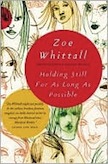 Holding Still for as Long as Possible
Holding Still for as Long as Possible
by Zoe Whittall
House of Anansi Press (Toronto). 312 pages, $15.95
“YOU PROBABLY like to imagine your death the way it should be: You are old. By old, you mean ready to die. Resolved. You are in bed, with your mind intact and loved ones encircling you. Your regrets are few; your pain minimal. Your last words: golden.” So opens a novel that is both timeless and contemporary, set in Toronto. If you suspect that this beginning does not foreshadow a serenely predictable death, you’d be right. This is a novel in which there’s always the possibility of violence and sudden endings. But it’s not set in a war zone, and the characters aren’t in their twilight years. They are in fact healthy, attractive, intelligent, club-going young adults for whom a thirtieth birthday is a major rite of passage. However, there is little stability in their world.
Josh, an FTM transperson, works as a paramedic, and his regular encounters with the extremes of human experience (including a rehearsal for a major general emergency) add poignancy to the more mundane scenes of daily life. Josh and his girlfriend Amy—who is bisexual, for lack of a better word—waste no time arguing or agonizing over the identity issues that divided the gay community in earlier decades. Josh is fully accepted by Amy’s upscale family. Amy, as a filmmaker, is accepted by a mixed crowd that includes other artsy types as well as Josh’s fellow medics.
In some ways, Josh and Amy and their friends are exactly what those who remember the Stonewall Riots of 1969 always hoped to see in the future: open-minded, pansexual, generous, free to express a range of sexual desires. They are capable of emotional commitment as well as guilt-free (but not reckless) casual hook-ups. Yet their lives are far from utopian. Terrorism, epidemics, climate change, and random violence give an apocalyptic tone to the culture of the youngest generation of adults. Text-messaging and the world of cyber-space have not replaced person-to-person contact—the year is 2005—but they have certainly complicated it.
Life for those who can’t really imagine living into middle age is shown to be no easier than it was for earlier generations. And the need for love and understanding is still a prime motivator of their behavior, as it is for everyone. The unraveling of the relationship between Josh and Amy is painful but fascinating to watch. After four years together, they both feel a sense of disconnect that is subtle at first; but, like a serious disease in the opening phase, it turns out to be incurable. In an early chapter, told from Amy’s viewpoint, they discuss their relationship:
Josh looked at me clutching my BlackBerry. “We’re so different,” he said. “Sometimes it still confounds me that we fell in love.”
“I know!” I said too loudly, like a hiccup.
“Although, when we first met, it seemed almost metaphysical, like we weren’t in control of it.”
“Otherworldly, for sure.”
As their differences expand the space between them, other people come into sharper focus. Their friend Roxy, described as a “community hub,” introduces Josh to Hilary, who now calls herself Billy, a 25-year-old has-been who was briefly famous as a singer at age sixteen. She has a past to live down, a few sad reminders of former wealth, and obsessive thought patterns that are an eerie parallel to the actual crises that comprise Josh’s work. Josh is irresistibly attracted to Billy, whose long-term girlfriend has run out of patience.
Alternating chapters are told from the viewpoints of Josh, Amy, Billy, and an anonymous narrator. All the characters seem equally believable, and all seem to deserve more happiness than they have at the moment. But like sunrise after a blizzard, happy outcomes appear after all. Holding Still is a hip, refreshing look at a generation that has been called post-feminist and could also be called “post-queer.” It takes place in a real city with actual street names and a recognizable nightlife. The author, whose first novel (Bottle Rocket Hearts) was named one of the best of 2007 by The Globe and Mail, Canada’s national newspaper, seems likely to have a long career in the literary mainstream.
________________________________________________________
Jean Roberta is a widely published writer living in Regina, Saskatchewan.






